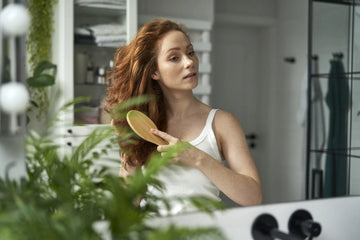Vitamins for healthy hair: These nutrients support your hair care
Healthy, strong hair is a beauty ideal for many people. It is often forgotten that a balanced diet plays an important role in the well-being of the hair. Certain vitamins and minerals help to care for the hair and provide it with optimal support. In this article, you will learn which vitamins are found in a balanced diet, how you can naturally integrate them into your diet and how you can promote the health of your hair with a good diet.
Why are vitamins important for hair?
Vitamins are essential nutrients that the body cannot produce itself and must be obtained through food. They are involved in many processes in the body that can also affect hair care. A balanced intake of vitamins and minerals can therefore be important to create a good basis for hair growth.
Important vitamins in a balanced diet
1. Vitamin A
Vitamin A is necessary for various functions in the body and is found in many foods. A balanced intake can help keep the skin - including the scalp - moisturized.
• Food sources: carrots, sweet potatoes, spinach, pumpkin, liver, egg yolk.
2. B vitamins (especially biotin and B12)
B vitamins support many metabolic processes and are involved in the formation of cells. They contribute to the health of skin and hair.
• Biotin (vitamin B7):
• Food sources: eggs, nuts, oatmeal, spinach, sweet potatoes.
• Vitamin B12:
• Food sources: meat, fish, dairy products, fortified plant-based milk products.
3. Vitamin C
Vitamin C is a well-known antioxidant and contributes to the normal function of the immune system. It also supports collagen formation, which is important for the normal function of skin and hair.
• Food sources: citrus fruits (oranges, lemons, grapefruits), peppers, strawberries, broccoli, kiwis.
4. Vitamin D
Vitamin D is produced by sunlight and is important for many functions in the body. In the winter months, it can be helpful to ensure adequate intake.
• Food sources: oily fish (salmon, mackerel), egg yolk, fortified foods (plant-based dairy products), mushrooms.
5. Vitamin E
Vitamin E is also an antioxidant and is found in many foods. It contributes to the maintenance of normal cells.
• Food sources: nuts (almonds, hazelnuts), seeds (sunflower seeds), avocados, vegetable oils (wheat germ oil, sunflower oil).
Other important nutrients in the diet
In addition to vitamins, minerals also play a role. A balanced diet with a variety of foods can help meet your needs:
• Iron:
• Food sources: red meat, legumes, green leafy vegetables, whole grains.
• Zinc:
• Food sources: meat, cheese, nuts, seeds, whole grains.
• Copper:
• Food sources: shellfish, nuts, seeds, whole grains.
Tips for a vitamin-rich diet
1. Balanced diet: Make sure you eat a varied diet with a variety of fresh foods. Fruits, vegetables, whole grains, nuts, seeds and healthy fats should be a regular part of your diet.
2. Don't forget proteins: Hair is mostly made up of keratin, a protein. Protein-rich foods such as legumes, eggs, fish, meat and dairy products can be part of a balanced diet.
3. Hydration: Drinking enough water is important for the entire body. Water helps regulate moisture levels.
4. Reduce stress: Stress can affect many areas of life. Relaxation techniques such as yoga, meditation or regular exercise can help reduce stress.
5. Take supplements only when necessary: Dietary supplements should only be taken after consulting a doctor, especially if a deficiency is suspected.
Conclusion
Vitamins are an important part of a balanced diet that can contribute to healthy hair. A diet with a variety of fresh, nutrient-rich foods helps ensure a supply of vitamins and minerals. Make sure you eat a varied diet to make your diet balanced. If you have specific questions about nutrition or a possible deficiency, it is advisable to consult a doctor or nutritionist.





